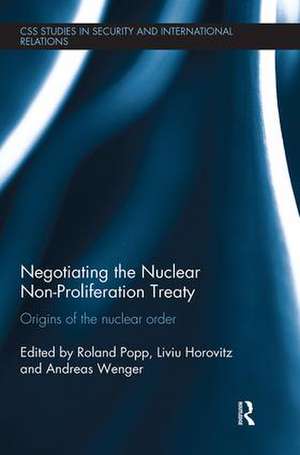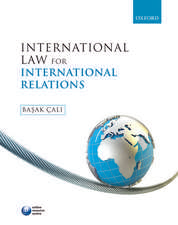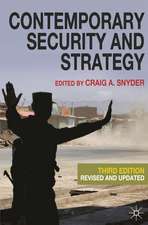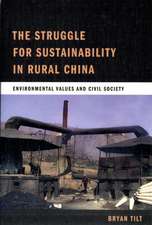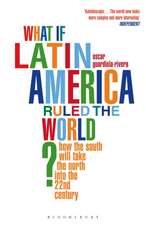Negotiating the Nuclear Non-Proliferation Treaty: Origins of the Nuclear Order: CSS Studies in Security and International Relations
Editat de Roland Popp, Liviu Horovitz, Andreas Wengeren Limba Engleză Paperback – 14 mar 2018
The NPT has been signed by 190 states and was indefinitely extended in 1995, rendering it the most successful arms control treaty in history. Nevertheless, little is known about the motivations and strategic calculi of the various middle and small powers in regard to their ultimate decision to join the treaty despite its discriminatory nature. While the NPT continues to be central to current nonproliferation efforts, its underlying mechanisms remain under-researched. Based on newly declassified archival sources and using previously inaccessible evidence, the contributions in this volume examine the underlying rationales of the specific positions taken by various states during the NPT negotiations. Starting from a critical appraisal of our current knowledge of the genesis of the nonproliferation regime, contributors from diverse national and disciplinary backgrounds focus on both European and non-European states in order to enrich our understanding of how the global nuclear order came into being.
This book will be of much interest to students of nuclear proliferation, Cold War history, security studies and IR.
| Toate formatele și edițiile | Preț | Express |
|---|---|---|
| Paperback (1) | 299.52 lei 6-8 săpt. | |
| Taylor & Francis – 14 mar 2018 | 299.52 lei 6-8 săpt. | |
| Hardback (1) | 848.96 lei 6-8 săpt. | |
| Taylor & Francis – 19 sep 2016 | 848.96 lei 6-8 săpt. |
Din seria CSS Studies in Security and International Relations
- 18%
 Preț: 1054.71 lei
Preț: 1054.71 lei -
 Preț: 445.56 lei
Preț: 445.56 lei -
 Preț: 413.55 lei
Preț: 413.55 lei -
 Preț: 408.74 lei
Preț: 408.74 lei - 12%
 Preț: 352.21 lei
Preț: 352.21 lei -
 Preț: 416.96 lei
Preț: 416.96 lei -
 Preț: 484.35 lei
Preț: 484.35 lei -
 Preț: 386.51 lei
Preț: 386.51 lei - 17%
 Preț: 295.45 lei
Preț: 295.45 lei -
 Preț: 447.51 lei
Preț: 447.51 lei -
 Preț: 414.32 lei
Preț: 414.32 lei -
 Preț: 279.72 lei
Preț: 279.72 lei - 17%
 Preț: 259.98 lei
Preț: 259.98 lei - 16%
 Preț: 262.14 lei
Preț: 262.14 lei - 18%
 Preț: 840.56 lei
Preț: 840.56 lei -
 Preț: 489.30 lei
Preț: 489.30 lei -
 Preț: 389.66 lei
Preț: 389.66 lei
Preț: 299.52 lei
Preț vechi: 341.57 lei
-12% Nou
Puncte Express: 449
Preț estimativ în valută:
57.31€ • 59.84$ • 47.33£
57.31€ • 59.84$ • 47.33£
Carte tipărită la comandă
Livrare economică 15-29 aprilie
Preluare comenzi: 021 569.72.76
Specificații
ISBN-13: 9781138540927
ISBN-10: 1138540927
Pagini: 260
Dimensiuni: 156 x 234 x 20 mm
Greutate: 0.45 kg
Ediția:1
Editura: Taylor & Francis
Colecția Routledge
Seria CSS Studies in Security and International Relations
Locul publicării:Oxford, United Kingdom
ISBN-10: 1138540927
Pagini: 260
Dimensiuni: 156 x 234 x 20 mm
Greutate: 0.45 kg
Ediția:1
Editura: Taylor & Francis
Colecția Routledge
Seria CSS Studies in Security and International Relations
Locul publicării:Oxford, United Kingdom
Public țintă
Postgraduate, Professional, and UndergraduateCuprins
1. Introduction: Small and Middle Powers in the Emergence of a Discriminatory Regime, Roland Popp & Andreas Wenger
PART I: Nuclear Nonproliferation and Alliance Cohesion
2. The Long Road to the NPT: From Superpower Collusion to Global Compromise, Roland Popp
3. In Favor of "Effective" and "Non-discriminatory" Non-Dissemination Policy: The FRG and the NPT Negotiation Process (1962-1966), Andreas Lutsch
4. The Birth of a Nuclear Non-Proliferation Policy: The Netherlands and the NPT Negotiations, 1965-1966, Elmar Hellendoorn
5. "A Turning Point in Postwar Foreign Policy:" Italy and the NPT Negotiations, 1967-1969, Leopoldo Nuti
6. Nonproliferation under Pressure: The Nuclear Debate within the Warsaw Pact, 1965-1968, Laurien Crump-Gabreëls
PART II: Global and Regional Dynamics in Negotiating the NPT
7. Unusual Suspects Down Under: Australia’s Choice for the Nonproliferation Treaty, Christine M. Leah
8. Between Idealism, Activism, and the Bomb: Why did India Reject the NPT?, A. Vinod Kumar
9. Non-Nuclear Japan? Satō, the NPT, and the US Nuclear Umbrella, Fintan Hoey
10. Mexican Nuclear Diplomacy, the Latin American Nuclear-Weapon-Free Zone, and the NPT Grand Bargain, 1962-1968, Jonathan Hunt
11. "A Glaring Defect in the System:" Nuclear Safeguards and the Invisibility of Technology, Jacob Darwin Hamblin
PART III: Conclusion
12. Nuclear Technology and Political Power in the Making of the Nuclear Order, Andreas Wenger & Liviu Horovitz
PART I: Nuclear Nonproliferation and Alliance Cohesion
2. The Long Road to the NPT: From Superpower Collusion to Global Compromise, Roland Popp
3. In Favor of "Effective" and "Non-discriminatory" Non-Dissemination Policy: The FRG and the NPT Negotiation Process (1962-1966), Andreas Lutsch
4. The Birth of a Nuclear Non-Proliferation Policy: The Netherlands and the NPT Negotiations, 1965-1966, Elmar Hellendoorn
5. "A Turning Point in Postwar Foreign Policy:" Italy and the NPT Negotiations, 1967-1969, Leopoldo Nuti
6. Nonproliferation under Pressure: The Nuclear Debate within the Warsaw Pact, 1965-1968, Laurien Crump-Gabreëls
PART II: Global and Regional Dynamics in Negotiating the NPT
7. Unusual Suspects Down Under: Australia’s Choice for the Nonproliferation Treaty, Christine M. Leah
8. Between Idealism, Activism, and the Bomb: Why did India Reject the NPT?, A. Vinod Kumar
9. Non-Nuclear Japan? Satō, the NPT, and the US Nuclear Umbrella, Fintan Hoey
10. Mexican Nuclear Diplomacy, the Latin American Nuclear-Weapon-Free Zone, and the NPT Grand Bargain, 1962-1968, Jonathan Hunt
11. "A Glaring Defect in the System:" Nuclear Safeguards and the Invisibility of Technology, Jacob Darwin Hamblin
PART III: Conclusion
12. Nuclear Technology and Political Power in the Making of the Nuclear Order, Andreas Wenger & Liviu Horovitz
Notă biografică
Roland Popp is a Senior Researcher at the Center for Security Studies, ETH Zurich.
Liviu Horovitz is a PhD Candidate at the Center for Security Studies, ETH Zurich.
Andreas Wenger is Director of the Center for Security Studies, ETH Zurich.
Liviu Horovitz is a PhD Candidate at the Center for Security Studies, ETH Zurich.
Andreas Wenger is Director of the Center for Security Studies, ETH Zurich.
Descriere
This book offers the first comprehensive and critical historical assessment of the negotiation of the NPT and the origins of the wider nonproliferation regime.
